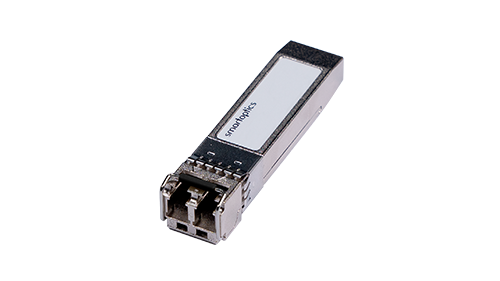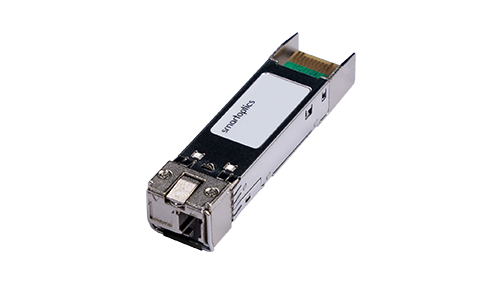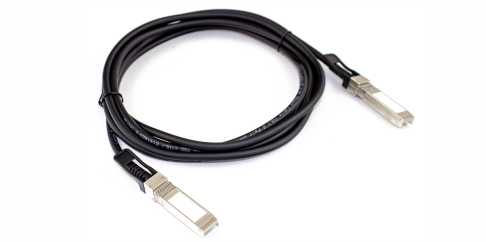
1G to 16G FC & 10G Ethernet SFP+ transceivers
Smartoptics multiprotocol SFP+ transceivers support Fibre Channel speeds up to 16G and 10G Ethernet for storage, enterprise and mobile networks.
What is SFP+?
SFP+ transceivers are focused on SAN protocols ranging from 1G up to 16G while also supporting other protocols such as Ethernet. SFP+ offers the versatility to be used in everything from Ethernet-based networks and broadband networks to SAN applications.
What is SFP+?
SFP+ (Small Form-Factor Pluggable Plus) is a compact, hot-pluggable optical transceiver optimized for high-speed storage and networking applications. It is widely used in enterprise storage networks, data center connectivity and mobile backhaul. Supporting data rates from 1G to 16G Fibre Channel (FC) and up to 10G Ethernet (10GbE), SFP+ offers a cost-efficient, scalable solution for both short and long-distance optical transport.
Smartoptics SFP+ transceivers approved for Brocade and Cisco
Smartoptics provides Brocade-approved SFP+ transceivers, tested for seamless interoperability with Fibre Channel storage networks. These transceivers support a range of FC speeds, ensuring reliable performance in Brocade environments. Additionally, Smartoptics SFP+ transceivers tested and approved for Cisco offer full compatibility with Cisco switches and storage platforms, making them a trusted choice for high-performance SAN and networking applications.
Smartoptics range of SFP+ transceivers
Smartoptics offers a comprehensive selection of SFP+ transceivers for a variety of networking environments, including:
- FC SFP+ for SAN – Available in multi-service (1G–11.3G FC) and FC-only (4G–16G FC) versions, designed for data center storage networking, from top-of-rack to inter-data center links.
- Ethernet SFP+ for 10G and mobile – The standard for 4G and 5G mobile backhaul and fronthaul, delivering low-latency 10G Ethernet connectivity for enterprise and carrier networks.
- Extended reach SFP+ – Multimode and single-mode fiber transceivers with CWDM and DWDM options for metro and regional optical transport over long distances.
With broad interoperability and multi-protocol support, Smartoptics SFP+ transceivers ensure seamless integration into existing networking infrastructure, enabling scalable and cost-efficient connectivity.
Selected benefits of Smartoptics SFP+ transceivers
- Tested and approved by Brocade and Cisco
- Optimized for mobile backhaul and fronthaul in 4G & 5G networks
- Multimode and single-mode fiber
- Enhanced digital diagnostic information via I2C interface
- Extended temperature versions available for harsh environments
- Easily reprogrammable for additional uses
- Rigorously tested for maximum reliability in demanding applications
- Dedicated 24/7 in-house support
- Multi-source agreement (MSA) compliant for seamless compatibility
Connecting SFP+ to RJ45 (copper Ethernet)
For short-distance copper Ethernet connections, Smartoptics SFP+ to RJ45 transceivers allow seamless 10GBASE-T Ethernet connectivity over standard CAT6A or CAT7 copper cabling. This enables data centers and enterprise networks to integrate high-speed copper links without additional fiber infrastructure, offering a cost-effective alternative for shorter runs.
SFP+ vs. SFP28 – Key differences
Many organizations compare SFP+ vs. SFP28 when planning high-speed network upgrades. While both SFP28 and SFP+ are multi-protocol optical modules supporting Ethernet and Fibre Channel with similar compact sizes, there are key differences:
| Feature | SFP+ | SFP28 |
| Data rate | Up to 16G FC / 10G Ethernet | 32G FC / 25G Ethernet |
| Backward compatibility | SFP+ ports support SFP | SFP28 ports supports SFP+ |
| Cost & efficiency | Lower power consumption | Higher bandwidth efficiency with lower cost per Gbps |
SFP+ remains a widely adopted and power-efficient choice for 10G Ethernet and 16G FC networks. However, for networks requiring higher speeds and greater efficiency, Smartoptics SFP28 transceivers offer a natural upgrade path.

Breakout applications
SFP+ aggregation
Smartoptics transponders allow multiple 10G SFP+ connections to be combined into a higher-speed uplink, enabling scalable network upgrades.
Most popular aggregation: 10x SFP+ (10G) → 1x QSFP28 (100G) uplink
This setup aggregates ten 10G SFP+ connections into a single 100G port, making it the preferred upgrade path for modern data centers and high-speed transport networks. QSFP28 only has four lanes, so to achieve 10 times 10G, you will need a specialized transponder or muxponder such as the DCP-110, which also allows a coherent 100G QSFP-DD output.
Other aggregation possibilities include:
4x SFP+ (10G) → 1x QSFP+ (40G) (for incremental upgrades and legacy 40G networking environments)

dac & aoc
SFP+ cables: DAC & AOC
Smartoptics provides a range of SFP+ cable solutions tailored to different connectivity needs:
SFP+ Direct Attach Copper (DAC) cables – Cost-effective, low-latency solutions for short-distance connections, such as rack-to-rack links within data centers.
SFP+ Active Optical Cables (AOC) – Use real transceivers with fiber optics, enabling longer-distance connectivity while maintaining a lightweight and flexible form factor.
These SFP+ cable solutions provide reliable, high-performance connectivity for data centers, enterprise networks and telecom applications.
Learn more or browes all our transceivers
Learn more about Smartoptics SFP+ transceivers
Download the overview datasheet for SFP+ transceivers, or browse all our transceivers, AOC and DAC cable assemblies.

Related products
Why smartoptics
Expand your network horizons
At Smartoptics, we believe strongly in an open approach, smart design principles, ambitious customer service and sustainable solutions.
Open
Committed to open solutions with no lock-in using latest open standards and an open culture of honesty.
Smart
Innovating smart design principles for plug-and-play, future-proof and scalable networking solutions.
Ambitious
Going the extra mile with in-house expert support and strong focus on customer satisfaction (NPS 82).
Sustainable
Doing our part with long product lifecycles, small footprints and energy efficiency optimizations.


